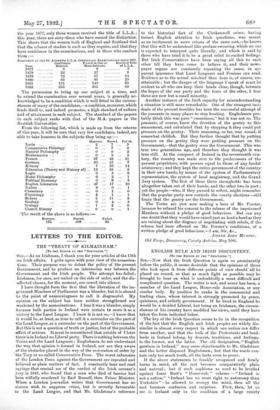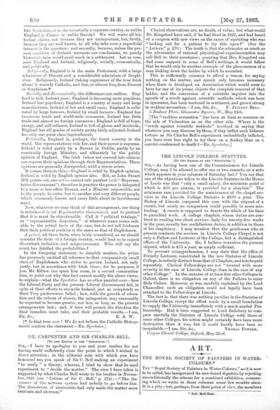ENGLISH RULE AND IRISH DISCONTENT. [To THE EDITOR OF THE
"SPECTATOR."] SIR,—Now that the Irish Question is again so prominently before the public, it seems desirable that the opinions of those who look upon it from different points of view should all be placed on record, so that as much light as possible may be brought to bear on what is undoubtedly a most difficult and complicated question. The writer is not, and never has been, a member of the Land League, Home-rule Association, or any similar body. By position he ranks in the commercial and trading class, whose interest is strongly promoted by peace, quietness, and orderly government. If he lived in England he would be a decided Liberal, but being an Irishman, the circum- stances of his country have modified his views, until they have taken the form indicated below.
The key of the Irish Question seems to lie in the recognition of the fact that the English and Irish peoples are widely dis- similar in almost every respect in which one nation can differ from another, and that the bulk of the Protestants and land- lords in Ireland belong, by descent, traditions, and feelings, to the former, not the latter. The old designation, " English garrison in Ireland," may seem objectionable to Mr. Gladstone and the better disposed Englishmen ; but that the words con- tain only too much truth, all the facts seem to prove.
If the above statements be frankly recognised and firmly borne in mind, all the rest becomes comparatively plain and natural ; but if such sophisms as used to be levelled against Isaac Butt's " Home-rule " scheme —" Ireland is not a nation," "Ireland has no more right to autonomy than Yorkshire "—be allowed to occupy the mind, then all the rest becomes confusion and surprises. First, then, let us see is Ireland only in the condition of a large county
like Yorkshire, or is she essentially a separate country, as unlike England as France is unlike Russia P We will waive all his- torical claims, not because they are unimportant, but, firstly, because they are well known to all who take even a superficial interest in the question ; and secondly, because, unless the pre- sent condition of Ireland warrants our conclusions, no purely historical claim would avail much in a settlement. Let us com- pare England and Ireland, religiously, socially, economically, and politically.
Religiously, England is in the main Protestant, with a large admixture of Dissent and a considerable admixture of Scepti- cism. Religiously, Ireland (taking cognisance of the true Irish alone) is warmly Catholic, and free, or almost free, from Dissent or Scepticism.* Socially and Economically, the differences are endless. Eng- land is rich, Ireland poor ; England is becoming more populous, Ireland less populous ; England is a country of many and large manufactures, Ireland of few and small ones; England is culti- vated by large farmers, Ireland by small farmers ; England has enormous trade and world-wide commerce, Ireland has little trade and almost no foreign commerce ; England is full of hope, energy, and self-reliance, Ireland is full of gloom and lassitude; England has all grades of society pretty fairly adjusted, Ireland has only one great class (agricultural).
Politically, England is, perhaps, the freest country in the world. Her representatives rule her, and their power is supreme. Ireland is ruled partly by a Bureau in Dublin, partly by an essentially foreign Minister, and ultimately by the public opinion of England. The Irish (when not coerced into silence) can express their opinions through their Representatives. These opinions are generally disregarded, until a storm arises.
It comes, then, to this,—England is ruled by English opinion, Ireland is ruled by English opinion also. But, as John Stuart Mill points out, one nation cannot rule another (vide" Represen- tative Government"), therefore in practice the power is delegated to a more or less effete Bureau, and a Minister responsible, not to the people he rules, but to another and very different people, which commonly knows and cares little about its troublesome ward.
Now, whatever we may think of this arrangement, one thing is certain—it is not Representative Government, and to pretend that it is must be objectionable. Call it " political tutelage," or " representative despotism," or whatever name seems suit- able to the actual facts of the case, but do not tell Irishmen that their political position is the same as that of Englishmen.
A priori, all these facts, when fairly considered, as we should consider the facts of a foreign country, would lead us to expect discontent, irritation, and misgovernment. Who will say the event has falsified the probabilities ?
In the foregoing statement, to simplify matters, the writer has purposely omitted all reference to that comparatively small class of Englishmen who strive to govern Ireland, not only justly, but in accordance with Irish ideas; for he purposes, if you, Mr. Editor, can spare him room, in a second communica- tion, to point out why this fact cannot modify the above views ; to explain—what the Spectator has so often puzzled over—how the Liberal.Party and the present Liberal Government fail, in spite of their efforts to reconcile Ireland, just as completely as their Tory predecessors failed ; how, with the growth of educa- tion and the reform of abuses, the antagonism may reasonably be expected to become greater, not less, so long as the present arrangements last ; and, if time will permit, the direction the final remedies must take, and their probable results.—I am, Sir, &c., E. A. W. [* Is that true now ? We do not believe the Catholic Bishops would confirm the statement.—En. Spectator.]



































 Previous page
Previous page